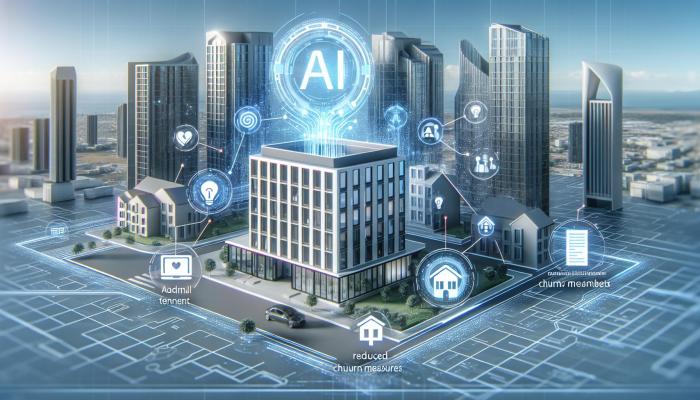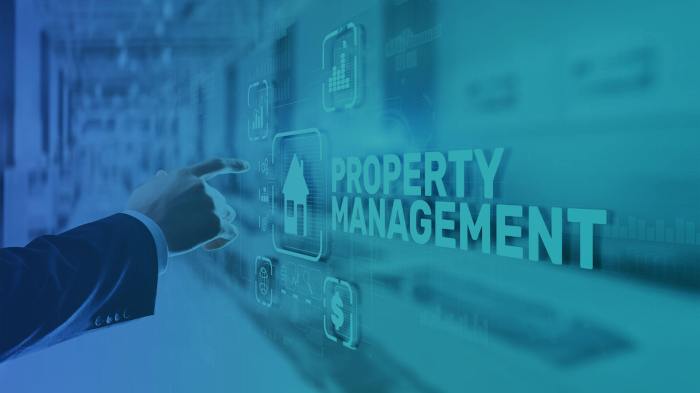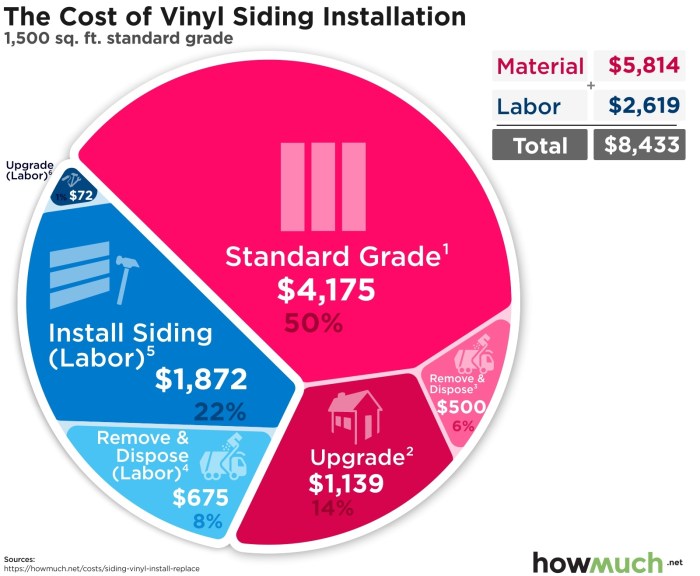Exploring the World of AI Property Management
Embark on a journey into the realm of AI property management, where technology meets real estate to revolutionize the way properties are managed. From enhancing efficiency to redefining decision-making processes, AI is reshaping the landscape of property management.
Delve deeper into the intricacies of AI in property management as we uncover its definition, applications, technologies, challenges, and future trends.
Definition of AI Property Management
AI property management refers to the use of artificial intelligence technology to streamline and optimize the management of properties, whether residential, commercial, or industrial. This innovative approach leverages AI algorithms and data analysis to automate various tasks and decision-making processes involved in property management.
Key Features of AI in Property Management
- Automated Maintenance Scheduling: AI can analyze data to predict maintenance needs and schedule repairs or upgrades proactively.
- Smart Tenant Screening: AI algorithms can assess tenant applications based on various criteria to find the most suitable renters.
- Dynamic Pricing Strategies: AI can analyze market trends and property data to optimize rental prices for maximum profitability.
- Enhanced Security Systems: AI-powered security systems can monitor properties in real-time and alert authorities in case of suspicious activities.
Benefits of Using AI in Property Management
- Increased Efficiency: AI streamlines processes, reduces manual tasks, and minimizes human error, leading to greater operational efficiency.
- Cost Savings: By automating routine tasks and optimizing resource allocation, AI helps property managers save time and money.
- Improved Decision-Making: AI provides valuable insights and data-driven recommendations to make informed decisions regarding property management strategies.
- Enhanced Tenant Experience: AI can personalize tenant interactions, anticipate needs, and improve overall tenant satisfaction.
Applications of AI in Property Management

AI is revolutionizing the property management industry by streamlining processes, increasing efficiency, and reducing costs. By leveraging AI technology, property managers can make more informed decisions, improve tenant satisfaction, and optimize property performance.
Smart Maintenance and Repairs
AI-powered tools can predict maintenance issues before they occur by analyzing historical data and trends. For example, sensors installed in properties can detect potential problems with HVAC systems or other equipment, allowing property managers to address issues proactively. This not only prevents costly repairs but also enhances tenant experience by ensuring that properties are well-maintained.
Automated Rent Collection and Lease Management
AI systems can automate rent collection processes, send payment reminders to tenants, and track lease agreements. This reduces the administrative burden on property managers and ensures timely payments. Additionally, AI can analyze market trends to help property managers set appropriate rental rates and negotiate leases effectively.
Enhanced Tenant Screening
AI algorithms can analyze rental applications and background checks to identify high-quality tenants. By assessing factors such as credit history, income verification, and rental history, AI can help property managers make more informed decisions about prospective tenants. This reduces the risk of rental defaults and eviction cases.
Energy Efficiency Optimization
AI technology can optimize energy usage in properties by analyzing consumption patterns and recommending adjustments to heating, cooling, and lighting systems. By implementing energy-efficient practices, property managers can reduce utility costs and minimize environmental impact.
Data-Driven Decision Making
AI algorithms can analyze vast amounts of data to provide insights into property performance, market trends, and tenant preferences. This enables property managers to make data-driven decisions regarding property investments, marketing strategies, and operational improvements. By leveraging AI technology, property managers can stay ahead of the competition and adapt to changing market conditions.
AI Technologies in Property Management
AI technologies have revolutionized the way property management tasks are handled, making processes more efficient and effective. By leveraging advanced technologies such as machine learning and chatbots, property managers can streamline various operations, from tenant screening to maintenance scheduling and rent collection.
Machine Learning in Property Management
Machine learning algorithms have the ability to analyze vast amounts of data to identify patterns and trends that can help property managers make informed decisions. These algorithms can be used to predict tenant behavior, optimize rent prices, and even detect potential maintenance issues before they escalate.
Chatbots for Tenant Communication
Chatbots are increasingly being used in property management to enhance tenant communication and streamline the process of addressing tenant inquiries and concerns. These AI-powered chatbots can provide quick responses to common questions, schedule maintenance requests, and even assist with rent payments, providing tenants with a more seamless experience.
Automated Maintenance Scheduling
AI technologies can automate the process of maintenance scheduling by analyzing historical data and predicting when maintenance is likely to be needed. By implementing predictive maintenance strategies, property managers can ensure that issues are addressed proactively, reducing downtime and improving tenant satisfaction.
Enhanced Decision-Making Processes
AI technologies play a crucial role in enhancing decision-making processes for property managers by providing valuable insights and recommendations based on data analysis. From predicting market trends to optimizing rental rates, AI empowers property managers to make strategic decisions that drive profitability and operational efficiency.
Challenges and Limitations of AI in Property Management

Implementing AI in property management comes with its own set of challenges and limitations that are important to consider. While AI technologies have the potential to revolutionize property management processes, there are certain obstacles that need to be addressed.
Common Challenges Faced When Implementing AI in Property Management
- Data Quality: Ensuring that the data input into AI systems is accurate and up-to-date can be a challenge, as inaccurate data can lead to flawed outcomes.
- Integration Complexity: Integrating AI systems with existing property management software and processes can be complex and time-consuming.
- Initial Investment: Implementing AI technologies in property management requires a significant initial investment, which may be a barrier for some organizations.
- Resistance to Change: Adopting AI in property management may face resistance from employees who are accustomed to traditional methods.
Limitations of AI Technologies in Handling Complex Property Management Tasks
- Complex Decision Making: AI systems may struggle with making complex decisions that require human intuition and judgment.
- Lack of Emotional Intelligence: AI lacks emotional intelligence, which is essential in handling certain tenant interactions and negotiations.
- Maintenance Issues: AI may not be able to handle physical maintenance tasks that require a human touch, such as repairs and renovations.
Potential Risks Associated with Relying Too Heavily on AI in Property Management
- Overreliance on Technology: Depending too heavily on AI systems can lead to a lack of human oversight, potentially causing critical errors to go unnoticed.
- Data Privacy Concerns: AI systems rely on vast amounts of data, raising concerns about data privacy and security issues.
- Loss of Personal Touch: Relying solely on AI may result in a loss of personal connections with tenants and property owners, impacting customer satisfaction.
Future Trends and Innovations in AI Property Management
AI advancements are set to transform the landscape of property management in the near future, bringing about significant changes and improvements in various aspects of real estate operations. From predictive analytics to IoT integration and virtual property tours, the future of AI in property management looks promising and revolutionary.
Predictive Analytics
Predictive analytics, powered by AI algorithms, will play a crucial role in forecasting market trends, property values, and tenant behavior. By analyzing historical data and patterns, property managers can make informed decisions regarding pricing, marketing strategies, and tenant retention. This data-driven approach will optimize property performance and enhance overall profitability.
IoT Integration
The integration of Internet of Things (IoT) devices in property management will enable real-time monitoring and control of various systems within buildings. From energy management and security to maintenance and tenant comfort, IoT sensors and devices will provide valuable insights and automate routine tasks.
This connectivity will streamline operations, reduce costs, and enhance the overall tenant experience.
Virtual Property Tours
Virtual reality (VR) and augmented reality (AR) technologies will revolutionize the way properties are viewed and marketed. Virtual property tours will offer prospective tenants immersive experiences, allowing them to explore properties remotely and make informed decisions without physically visiting the site.
This innovative approach will save time, increase convenience, and attract a wider audience of potential tenants.
Revolutionizing the Real Estate Industry
AI's impact on property management goes beyond operational efficiencies—it has the potential to revolutionize the entire real estate industry. By leveraging AI technologies, real estate professionals can analyze vast amounts of data, enhance decision-making processes, and deliver personalized experiences to tenants and property owners.
This shift towards data-driven, AI-powered solutions will drive innovation, competitiveness, and growth in the real estate sector.
Closing Summary

As we conclude our exploration of AI property management, it's evident that the future holds immense possibilities for innovation and transformation in the real estate industry. With AI paving the way for predictive analytics, IoT integration, and virtual property tours, property managers are poised to embrace a new era of efficiency and excellence.
Question Bank
What are some common challenges faced when implementing AI in property management?
Some common challenges include data privacy concerns, initial setup costs, and the need for specialized training for staff.
How does AI enhance decision-making processes for property managers?
AI provides property managers with data-driven insights and predictive analytics, enabling them to make informed decisions quickly and efficiently.
What are some emerging trends in AI property management?
Emerging trends include predictive analytics for forecasting property trends, IoT integration for smart property monitoring, and virtual property tours for immersive experiences.




